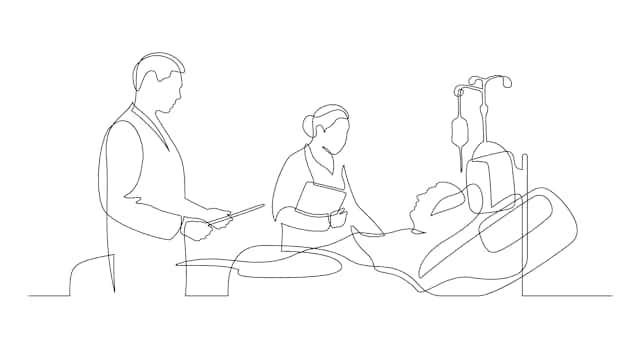Dealing with death is part of the job description for all doctors. For those working in general practice, this often means planning ahead, with GPs encouraged to keep a register of patients thought to be in the last year of their life.
One reason for this is to identify which patients might benefit from palliative and supportive care - the kind of care which focuses on symptom control, rather than cure. At the moment, these registers appear to consist mainly of patients with cancer. Yet most people (72%) in England don’t actually die of cancer. So why aren’t other dying patients being registered?
To answer this question, it is helpful to think about how we die. As a GP, I can often predict, to some degree, a decline in a patient’s health over a period of weeks or months if they have cancer. Plus, in my experience, people with cancer are likely to have already thought and talked about death. So it may not be a surprise to them when I initiate a conversation about their palliative care needs, offering them the opportunity to develop a plan for their care at the end of life, and add them to the register.
But the reality is that most of us will die in old age, with 40% of people in England now dying aged 85 and over. As we get older, we are more likely to die of a long-term condition, such as heart failure or Chronic Obstructive Pulmonary Disease (COPD) or, in advanced old age, of dementia and frailty.
These scenarios are much less predictable. The dying process may take place over many years, either by gradual decline interspersed by serious episodes of ill health, or “prolonged dwindling”. Our research suggests that GPs find it much harder to recognise these patients as being at the end of life than patients who have cancer. As a result, they struggle to initiate conversations about dying and palliative care.
Read more: Empathy in healthcare is finally making a comeback
The GPs we spoke to told us that rather than use formal professional tools to identify patients at the end of life, such as the Gold Standards Framework Proactive Identification Guidance – which lists markers of poor prognosis in a range of conditions (such as requiring oxygen at home in patients with COPD) – they use softer, more instinctive, markers of deterioration, such as patients becoming housebound or requiring an increase in formal care.
They also highlighted the importance of good communication from hospital specialists to aid them in this process. A good example of this is the Poor Prognosis Letter project. Developed by doctors working in Bristol, this enables hospital teams to flag up patients who might be coming towards the end of life to their GPs at the point of discharge from hospital.
This is in addition to a more traditional discharge summary, which details the reason for the admission and the care that the patient has received while in hospital. Discharge summaries rarely provide the GP with information about the patient’s prognosis.
Important conversations
Identification of patients who might be in the last phase of their life allows discussion with them and their families about their care needs, helping to alleviate physical symptoms and provide emotional and psychological support. It is also an opportunity for the patient to communicate their wishes about how and where they would like to die.
This type of discussion is clearly not appropriate for a ten minute appointment, and GPs are under significant workload pressures, so time can be a constraint. Many doctors are worried about initiating these conversations with patients and their families, for fear of causing distress, because there is usually some uncertainty around prognosis. However there is good evidence that patients and their families usually welcome these open conversations.
Patients and their families don’t have to wait for a healthcare professional to initiate these conversations and the charity Compassion in Dying encourages people, and supports them, to start talking to their doctor about their wishes for care and treatment.
I would be delighted, and probably relieved, if a patient approached me to talk about their wishes and preferences for care at the end of life. I suspect that many of my colleagues would feel the same.
As a profession we are trying to get better at this, but we also need the public to be aware, and to think about initiating the conversation with their own GP. We might not always know when death is round the corner, so thinking and talking about how we want to die is important for us all.

